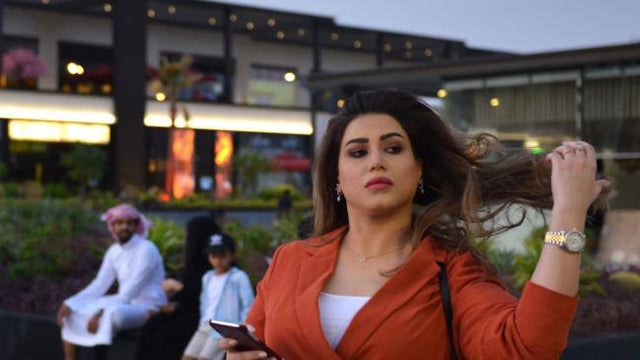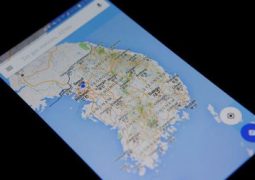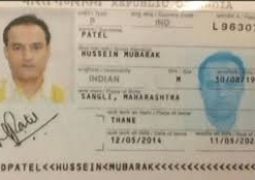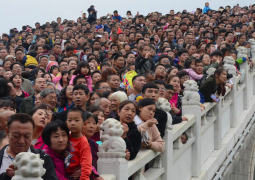Rebel Saudi women appear in public without hijab, abaya; onlookers stunned

Wearing western clothes at a mall in Riyadh as she walks next to four women wearing niqabs . Pic courtesy of DAILY MAIL
SOME rebel women have started to shun the obligatory abaya when they leave the house in a bold push for social liberties by young Saudis.
The billowy over-garment, usually all-black, is customary public wear for women in the ultra-conservative Islamic kingdom, where it is widely seen as a symbol of piety.
Last year, Crown Prince Mohammed bin Salman hinted during an interview with CBS that the dress code may be relaxed, saying the robe was not mandatory in Islam.
Defiant Mashael al-Jaloud, 33, turned heads and drew gasps as she strutted through a Riyadh mall last week without a body-shrouding abaya.
The human resources specialist strolled through a mall wearing nothing but a burnt orange top over baggy trousers.
While walking around the mall Jaloud, pictured, was asked if she was a celebrity or model but told the shocked veiled women she was just a normal Saudi woman without an abaya. Pic courtesy of DAILY MAIL
In the crowd there were audible gasps and arched eyebrows. Women veiled head-to-toe stared and some mistook her for a celebrity or model, asking: “Are you famous?”
Jaloud laughed and told the shocked people that she was a normal Saudi woman.
However, she revealed that she has faced some hostility since ditching the abaya and at a supermarket in Riyadh a fully-veiled woman threatened to call the police.
Jaloud also said that although she is remaining defiant, she is still forced to wear an abaya and headscarf to work or risk losing her job.
Jaloud is one of only a handful of women who have abandoned the abaya in recent months.
But the trend underscores a bold push for social liberties by young Saudis that may outstrip the monarchy’s capacity for change.
Manahel al-Otaibi, a 25-year-old activist, has also foregone the garment.
“For four months I have been living in Riyadh without an abaya,” said Otaibi, walking along Tahlia street, a restaurant-lined thoroughfare, in casual overalls.
“I just want to live the way I want, freely and without restrictions. No one should force me to wear something I don’t want.”
The abaya, which has existed for thousands of years but only became obligatory in recent decades, is also mandatory for non-Muslim women in the kingdom.
Last year Crown Prince Mohammed bin Salman, pictured, hinted that the dress code may be relaxed, saying the robe was not mandatory in Islam. Pic courtesy of DAILY MAIL
The dress code was once fanatically enforced by the now-neutered religious police, and uncovered women still face random harassment in a conservative nation where attire is often associated with chastity.
“There are no clear laws, no protection. I might be at risk, might be subjected to assault from religious fanatics because I am without an abaya,” Jaloud said.
In July, she posted a video on Twitter revealing that another Riyadh mall had stopped her from entering without an abaya.
She said she had tried unsuccessfully to persuade its guards by playing Prince Mohammed’s television interview, in which he said women were only expected to wear “decent, respectful clothing” – not necessarily an abaya.
In response to her post, the mall tweeted that it would not permit entry to “violators of public morals.”
A Saudi royal also condemned her on Twitter, calling her a publicity seeker and demanding that she be punished for the “provocative” act.
Despite Crown Prince Mohammed bin Salman’s sweeping liberalisation drive, the practice continued as no formal edict followed.
Some women mounted a rare social media protest against the restriction, posting pictures of themselves wearing the figure-concealing garment inside out.
Activist Manahel al-Otaibi, 25, has been living in Riyadh without wearing the abaya for four months and said: ‘I just want to live the way I want, freely and without restrictions’. Pic courtesy of DAILY MAIL
In a regulation that seems to be arbitrarily enforced, the Saudi labour ministry says on its website that working women are expected to be “modest, well-covered” and should not wear anything “transparent”.
Prince Mohammed has sought to shake off his country’s ultra-conservative image by allowing cinemas, mixed-gender concerts and greater freedoms for women, including the right to drive.
As part of the liberalisation, the kingdom has invited a host of international musicians to perform, such as rapper Nicki Minaj, well known for her skin-baring music videos.
“(Minaj) is going to shake her backside and all her songs are about sex… and then everyone tells me to wear the abaya,” a young Saudi woman fumed in a recent online video that went viral.
Minaj eventually can
celled her visit, citing the kingdom’s poor human rights record.
Saudi Arabia’s easing of travel restrictions on women was hailed as a historic leap for gender equality, but it also drew anger from hardliners backing male ‘guardianship’ rules (file picture). Pic courtesy of DAILY MAIL
But the sentiment encapsulates the tussle between a mostly young population clamouring for greater freedoms and hardliners alarmed by the pace of reforms they see as un-Islamic.
But Jaloud argued that the abaya is “not linked to religion”.
“If it was, Saudi women wouldn’t take them off when they go outside the kingdom,” she said. – DAILY MAIL
- Previous Malaysians have responsibility to uphold unity, says Dr M
- Next Haze crisis: Kuching declared ‘world’s most polluted city’
















